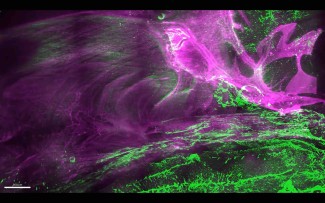Understanding neuroinflammation to cure brain diseases, and Paris Brain Institute-Yale collaboration
Neuroinflammation contributes to the onset and progression of many neurologial diseases, especially MS and PD. Characterizing undesratding and controlling neuroinflammation may help predict disease onset and progression, and improve therpeutic approaches.
To date, there are no procedures for simultaneously mapping and profiling the cellular and molecular states of neuroinflammation. This technological bottleneck is limiting the early diagnosis, progression assessment and prognosis of neurological diseases, and most importantly, is limiting early interventional therapies.
The project's goals
The main goal of the NEIMO program is to generate and integrate the most advanced procedures to simultaneously image and profile the cellular and molecular states of neuroinflammation in multiple sclerosis and early Parkinson’s disease, to know how monitoring neuroinflammation can inform the prediction of disease onset and the assessment of its progression and response to treatments.
The Yale School of Medicine and Paris brain Institute partners provide exceptional equipment and methodological expertise from leaders in the fields of brain imaging and neuroimmunology, as well as a strong history of collaboration and complementary expertise in neurobiology, immunology, vascular biology, brain imaging and computer science.
Aim 1. Monitor neurinflammatory mechanisms in patients.
Focusing on lymphatic dysfunction and inflammation, we will investigate early events leading to the onset diseases in early-stage Multiple Sclerosis and REM-sleep Behavior Disorder patients from both Yale and the Paris Brain Institute. The goal is to understand disease onset and progression through molecular profiling in blood and other samples, with a focus on single cell RNA-seq and cytokine measurements.
Aim2. Image brain fluid drainage and neuroinflammation.
We will leverage recent advances in imaging techniques to track fluid drainage and neuroinflammation in early MS, RBD, and idiopathic intracranial hypertension (IIH), by using MRI and PET-MRI imaging. We aim to identify early disease biomarkers and potential therapeutic targets, with imaging markers correlating with inflammation levels.
Aim 3. Generate AI-assisted methods to automate data analysis.
We will create AI tools to automatize the extraction and integration of neuroimaging and omics data, enabling the identification of neuroinflammatory signatures in a cross-modal approach (e.g. with causal inference frameworks).
Aim 4. Generate new predictive models of disease progression.
We will develop novel statistical models to describe disease progression, predict clinical outcomes, and identify subtypes based on neuroinflammation markers. We will compare various modeling approaches to track disease trajectories and predict clinical outcomes, particularly in RBD, MS, and IIH.
Aim 5. Spread open-source AI tools through an interactive platform.
We will promote scientific and clinical use of developed datasets and tools through open-source AI tools, softwares and datasets, organized data challenges, and patented methods.
ées et de méthodes brevetées.







